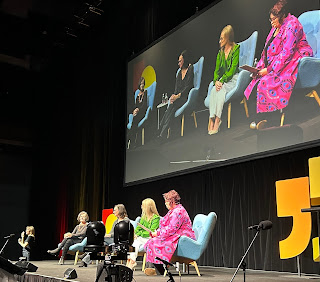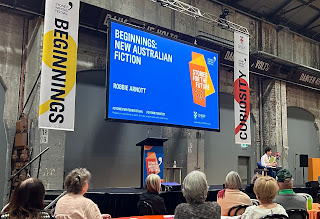On Friday 26 May 2023 I had tickets for three sessions but also saw two more on the Curiosity Stage.
Bringing the Past to Life
I really wanted to see Geraldine Brooks at SWF and tossed up between attending her solo session about her latest novel Horse, or attending this panel session on writing historical novels. I am so pleased that I went with the panel session, as it allowed me to learn more about the craft of historical novel writing and hear from authors I may not have seen otherwise.
This session was chaired by Kate Evans and featured Geraldine Brooks, Pip Williams (
The Dictionary of Lost Words) and Sally Colin-James (
One Illumined Thread). Evans asked each of the women to think of an object which sparked their interest in the subject of their novels. Brooks spoke about the skeleton of the racehorse Lexington which had been in the attic of the Smithsonian, for Williams it was a bone folder used in traditional bookbinding, and for Colin-James it was a black glass vial with a stopper.
They each told the backstory of their novels and what drew them to it. To be honest, prior to the session I wasn't really interested in Geraldine Brooks' novel
Horse as I find all sports with animals abhorrent. But as she spoke about the book, I realised it was a far deeper story. Brooks said 'I thought it was just going to be about the horse' but she soon learned that slavery underpinned the horsing industry. Her story about the book was so interesting, I ended up getting a copy of the book after the session!
Both Williams and Colin-James wrote about women who were largely invisible. I had never heard of Colin-James or her novel One Illumined Thread, which is a sweeping tale that begins in King Herod's Judea and traverses time to Renaissance Florence and modern day Australia.
The panel spoke about their research process and agreed that sometimes you can go down rabbit-holes that may not be helpful. Brooks said 'I let the story tell me what I need to know. There is a risk you get lost in the research. I try and resist cramming everything in and follow the line of fact as far as it leads.'
After the session I met Pip Williams and she signed a copy of The Dictionary of Lost Words for me. I had met Brooks the day before at the book signing.
Eleanor Catton: Birnam Wood
Having finished
Birnam Wood just days before the festival, I was thrilled to attend the session on the book with author Eleanor Catton interviewed by Beejay Silcox.

This was a fascinating session. Catton is erudite, articulate and accessible. Silcox asked such thought-provoking questions that added greatly to my admiration of both the author and the novel.
Catton was interested in irony. 'We often feel most ourselves when pretending to be someone else. I knew I wanted to write a Shakespearian tragedy.' She spoke about Macbeth and his addiction to prophecy and how any one of the novel's characters could be Macbeth as each has a blindspot which risks bring about their downfall and a Lady Macbeth character on their shoulder.
Silcox praised her writing and the complex themes across the novel, particularly as it was unclear where Catton stood on the topics raised.

Catton said she was influenced by Jane Austen's
Emma and praised the way the reader is able to see things that Emma does not (like Mr Elton's desire for her), and as such the reader feels superior - 'the exact quality that Austen satirises'. Catton said that 'Austen is the heir to Shakespeare's comedy. There is not much difference between comedy and tragedy. Any book that takes human beings seriously needs to be a comedy.' I now want to re-read
Birnam Wood and reflect on the Austen influence.
After the session I met Cattton at the book signing where she signed my copies of Birnam Wood and The Luminaries.
Raina MacIntyre: Dark Winter
Next up, I swung by the Curiosity stage to listen to UNSW Professor Raina MacIntyre, epidemiologist, speak about pandemics.
MacIntyre was the voice of reason I listened to throughout the pandemic and I was interested to hear what she was talking about. She has just written a book,
Dark Winter: An insider's guide to pandemics and biosecurity (2022), and talked about the recurring pattens of denial and failure to learn from each outbreak.
She spoke about virus mutations, engineering, lab leaks, and cover ups - giving examples of historical and contemporary events. She also talked about insider threats and information warfare.
It was a fascinating session but one which turned my anxiety up to 11! By my reckoning, less than 10% of festival attendees wore masks despite the new wave of COVID and the bad flu season. I wore one throughout and after MacIntyre's session I am so glad I did!
Clementine Ford: The Myth of Marital Happiness
I stayed at the Curiousity stage to hear feminist writer Clementine Ford deliver a talk from her forthcoming book
I Don't, due for publication on 31 October 2023. In this lecture Ford spoke about weddings and various traditions that have arisen in the recent past to further the objectives of the 'wedding industrial complex'. She spoke about bouquet tosses, virginity tests, white wedding dresses and more. She also spoke about the cost premium on weddings (venues, flowers, cakes etc). I have a real soft spot for Ford as a fearless and outspoken advocate for women. I enjoyed this session and will most likely read her book when it is published.
Colson Whitehead: Harlem Shuffle
American Pulitzer Prize winning novelist Colson Whitehead was interviewed by Michael Williams about his latest book Harlem Shuffle (2021) and his forthcoming sequel Crook Manifesto (2023).
Williams began by asking him why he changed genre from book to book. Whitehead explained that he admires filmmakers like Scorsese and Kubrick who push themselves to do something different each time. He said 'usually when I am done I want to do something very different.' After the success of
The Underground Railroad and
The Nickel Boys, he decided he wanted to do a heist novel.
He said 'I love the heist genre' and referred to great heist films like
Ocean's 11, Rafifi and
Asphalt Jungle. They spoke about the mechanics of a heist, bring a crew together. Williams asked him who he would be in heist. Whitehead suggested he would be the master planner or demolition expert. He said he wouldn't be the wheelman as he only got his driver's licence a year ago.
In Harlem Shuffle the protagonist is the fence, an unusual choice. The novel is divided into three capers, and is the first of a trilogy of novels. This one is set in the 1950s and 1960s, but the sequels will age with Ray through the decades.
After the session I met Colson Whitehead and he signed copies of The Underground Railroad, The Nickel Boys and Harlem Shuffle for me. While I haven't bought it yet, his zombie novel Zone One is also of interest.
Book Signings
Today I met Pip Williams, Eleanor Catton and Colson Whitehead and had the following books signed;
- Pip Williams - The Dictionary of Lost Words (2020)
- Eleanor Catton - The Luminaries
- Eleanor Catton - Birnam Wood
- Colson Whitehead - The Nickel Boys
- Colson Whitehead - The Underground Railroad
- Colson Whitehead - Harlem Shuffle
Read more about my SWF2023 here:
- SWF2023 - Overall impressions
- Day One - Bernardine Evaristo; Shehan Karunatilaka
- Day Two - Sophie Cunningham; Anne Casey-Hardy; Fiona Kelly McGregor; Brigitta Olubas; Robbie Arnott; George Monbiot; Sarah Holland-Batt; Jane Harper; Richard Fidler; Peter Frankopan
- Day Three - Geraldine Brooks; Sally Colin-James; Pip Williams; Eleanor Catton; Raina MacIntyre; Clementine Ford; Colson Whitehead
- Day Four - Jennifer Robinson; Hedley Thomas; Helen Garner; Sarah Krasnostein; Pip Williams; Richard Flanagan; Eleanor Catton; Colson Whitehead; Tracey Lien; Sam Neill; Bryan Brown
- Day Five - Barrie Cassidy; Laura Tingle; Niki Savva; Amy Remeikis; Margot Saville; Simon Holmes A Court; Helen Haines; Margaret Simons; Paddy Manning; Kerry O'Brien; Thomas Mayo
 This was a fascinating session. Catton is erudite, articulate and accessible. Silcox asked such thought-provoking questions that added greatly to my admiration of both the author and the novel.
This was a fascinating session. Catton is erudite, articulate and accessible. Silcox asked such thought-provoking questions that added greatly to my admiration of both the author and the novel.  Catton said she was influenced by Jane Austen's Emma and praised the way the reader is able to see things that Emma does not (like Mr Elton's desire for her), and as such the reader feels superior - 'the exact quality that Austen satirises'. Catton said that 'Austen is the heir to Shakespeare's comedy. There is not much difference between comedy and tragedy. Any book that takes human beings seriously needs to be a comedy.' I now want to re-read Birnam Wood and reflect on the Austen influence.
Catton said she was influenced by Jane Austen's Emma and praised the way the reader is able to see things that Emma does not (like Mr Elton's desire for her), and as such the reader feels superior - 'the exact quality that Austen satirises'. Catton said that 'Austen is the heir to Shakespeare's comedy. There is not much difference between comedy and tragedy. Any book that takes human beings seriously needs to be a comedy.' I now want to re-read Birnam Wood and reflect on the Austen influence.








































